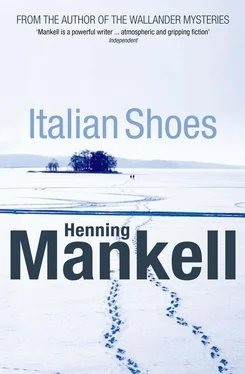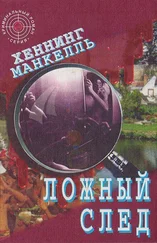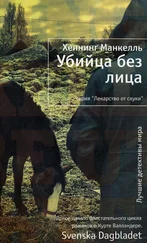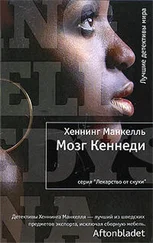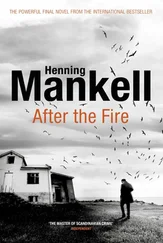Louise came and sat down next to me, glass in hand.
‘The family,’ she said. ‘I don’t know now if I want to use the surname Welin or Hörnfeldt. Maybe I’ll be Louise Hörnfeldt-Welin. Occupation: letter writer.’
She had a camera with her, and took a picture of Harriet and me sitting there, with glasses in our hands. Then she took a picture with herself in it as well.
‘I have an old-fashioned camera,’ she said. ‘I have to send the films away to be developed. But now I’ve got that snap I’ve always dreamt about.’
We drank a toast to the summer evening. I thought about the fact that Harriet was forced to wear a pad under her flimsy summery dress, and that the beautiful Louise really was my daughter.
Louise went to her caravan to change her clothes. The cat suddenly jumped up on to the table. I shooed her down. She looked offended, and slunk away. We sat there in silence, listening to the muted murmuring of the sea.
‘You and I,’ said Harriet. ‘You and I. And then, suddenly, it’s all over.’
By seven o’clock it was dead calm and plus seventeen degrees.
Jansson and the Lundmans arrived together. The boats formed a friendly little convoy of two, both with flags fluttering from the stern. Louise stood waiting for them on the jetty, looking radiant. Her dress was almost provocatively short, but she had pretty legs and I recognised the red shoes she had on — she’d been wearing them when she stepped out of the caravan and I saw her for the first time. Jansson had squeezed himself into an old suit that was on the tight side, Romana was glittering in red and black and Hans was dressed all in white and sported a yachtsman’s cap. Andrea was wearing a blue dress with a yellow hairband. We moored the boats, spent a few minutes on the little jetty chatting about the summer that had arrived at last, then proceeded up to the house. Jansson’s eyes looked slightly glazed and he stumbled a couple of times, but nobody minded — least of all Harriet who heaved herself up off her chair without assistance and shook hands with everybody.
We had decided to tell the truth: Harriet was Louise’s mother, I was her father, and once upon a time Harriet and I were almost married. Now Harriet was ill, but not so bad that we couldn’t all sit out under the oak trees this evening and have dinner.
On reflection, it seemed to me that, at the beginning, our party was reminiscent of a little orchestra, with all the individual members tuning their instruments. We talked and talked, and gradually achieved the right sound. At the same time we ate, drank toasts, carried dishes back and forth, and sent our laughter echoing across the skerries. Harriet seemed in perfectly good health while this was all happening. She spoke to Hans about emergency flares, about the price of groceries to Romana, and she asked Jansson to tell us about the strangest delivery he’d made during all his years as a postman. It was her party, she was the one who dominated, conducted and blended all the sounds to form a melodious chord. Andrea said nothing. Soon after the start she had clung tightly to Louise, who allowed herself to be held. We all got drunk, of course, Jansson first — but he never lost control. He helped Louise to carry plates and didn’t drop a single one. As dusk fell, he was the one who lit the candles and the citronella spirals Louise had bought to keep the mosquitoes away. Andrea was giving the adults searching looks. Harriet, who was sitting opposite her, occasionally stretched out her hand and touched Andrea’s fingertips. I felt very sad as I sat there, watching those fingers touching. One of them would soon die, the other would never really understand what it meant to live. Harriet noticed me watching them and raised her glass. We touched glasses and drank.
Then I gave a speech. It wasn’t prepared at all, not consciously anyway. I talked about simplicity and extravagance. About perfection, which may not exist, but whose existence can be sensed when in the company of good friends on a lovely summer’s evening. The Swedish summer was unpredictable, and never very long. But it could be stunningly beautiful, as it was this very evening.
‘You are my friends,’ I said. ‘You are my friends and my family, and I have been an inhospitable prince on this little island of mine, and never welcomed any of you here. I thank you for your patience, I shudder to think what you may have thought in the past. I hope this will not be the only time we meet like this.’
We drank. A gentle evening breeze blew through the crowns of the oak trees, and made the candle flames flutter.
Jansson tapped his glass and stood up. He was swaying slightly, but was able to stand upright. He said nothing. But then he started singing. In a staggeringly sonorous baritone voice he sang ‘Ave Maria’ in a way that sent shivers down my spine. I think everybody around the table had a similar reaction. Hans and Romana looked just as astonished as I must have done. Nobody seemed to know that Jansson had such a powerful voice. I had tears in my eyes. Jansson stood there, with all his imagined aches and pains, in a suit that was too small for him, singing in a way that gave the impression that a god had come down to join us and celebrate this summer evening. Only he could explain why he had kept this voice of his a secret.
Even the birds fell silent and listened. Andrea was open-mouthed. These were powerful, magic moments. When he had finished and sat down, nobody said a word. In the end, Hans broke the silence and said the only thing it was possible to say.
‘Well, I’ll be damned!’
Jansson was bombarded with questions. Where did he learn to sing like that? Why had he never sung before? But he didn’t answer. Nor did he want to sing any more.
‘I’ve delivered my thank-you speech,’ he said. ‘I sang. I only wish this evening would go on for ever.’
We carried on drinking and eating. Harriet had put down her conductor’s baton, and now conversations criss-crossed haphazardly. We were all drunk. Louise and Andrea sneaked down to the boathouse and the caravan. Hans got it into his head that he and Romana should dance. They hopped and bounced round the back of the house dancing what Jansson maintained was a polka, and reappeared round the other side doing what looked more like a hambo.
Harriet was enjoying herself. I think there were moments during the evening when she felt no pain, and forgot that she would soon die. I served more wine to everybody except Andrea. Jansson staggered off to have a pee behind the bushes, Hans and Romana began an arm-wrestling match, and I switched on my radio: music, something dreamy for the piano by Schumann, I thought. I sat down beside Harriet.
‘Things turned out for the best,’ she said.
‘What do you mean?’
‘We would never have been able to live together. Before long I’d have tired of all your eavesdropping and searching through my private papers. It was as if I had you under my skin. You made me itch. But as I was in love with you, I ignored that. I thought it would pass. And it did. But only when you’d gone away.’
She raised her glass and looked me in the eye.
‘You’ve never been a good person,’ she said. ‘You’ve always shrugged off your responsibilities. You’ll never become a good person. But maybe a bit better than you are now. Don’t lose Louise. Look after her and she’ll look after you.’
‘You should have told me,’ I said. ‘I had a daughter for all those years without knowing.’
‘Of course I should have told you. I could have found you if I’d really tried. But I was so angry. It was my way of getting revenge. Keeping your child for myself. I’m being punished for that now.’
‘How?’
‘I feel regret.’
Jansson staggered up to us and sat down on the other side of Harriet, oblivious to the fact that we were deep in conversation.
Читать дальше
